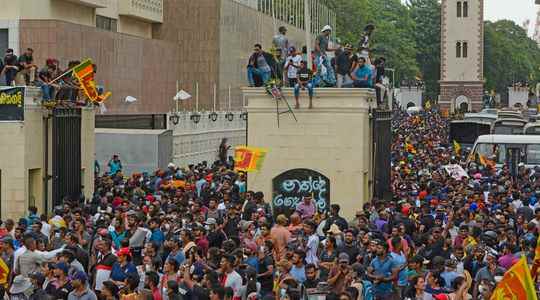Sri Lanka is sinking further into chaos. The president, Gotabaya Rajapaksa, fled his palace in Colombo on Saturday July 9. A few minutes later, it was stormed by hundreds of demonstrators. Videos show Sri Lankan citizens inside the place of power or in the swimming pool which is in the gardens. They accuse its owner of being responsible for the catastrophic economic crisis that the country is going through. “The president was escorted to a safe place,” according to a source from La Défense. “He is still the president, he is protected by a military unit,” she added.
The economic slump is therefore followed by a political crisis: Sri Lankan Prime Minister Ranil Wickremesinghe said in a press release that he was ready to resign to make way for a government of national unity. He called an emergency government meeting to discuss a “quick resolution” to the situation. Gotabaya’s right-hand man invited the leaders of the political parties to join this meeting, and also asked that the Parliament be convened.
In recent days, tens of thousands of people had taken part in demonstrations to demand the resignation of Gotabaya Rajapaksa. The protests were so violent that, on Friday, “police forces imposed a curfew to try to discourage protesters from taking to the streets”. But the measure was lifted after threats of legal action against the police chief from opposition parties, human rights activists and the country’s bar association.
Sri Lanka strangled by debt
The head of state is held responsible for the unprecedented crisis hitting the small island in the Indian Ocean and causing galloping inflation – which stands at around 70% – as well as serious shortages of fuel, electricity and food. In this country in need of foreign currency to import foodstuffs, the war in Ukraine and the resulting surge in prices put pressure on the already battered economy of the former Ceylon. The United Nations estimates that around 80% of the population is skipping meals to cope with shortages and rising prices.
Sri Lanka defaulted in April on its $51 billion foreign debt, and began bailout talks with the International Monetary Fund. The country of 22 million inhabitants is strangled by heavy debts, contracted mainly with Japan and China, to which it has ceded one of its ports. This crisis, on a scale unprecedented since the country’s independence in 1948, has been aggravated by a series of bad political decisions, according to economists. If the war in Ukraine seems to serve as a scapegoat for the Sri Lankan power, the financial difficulties are older.
In May 2021, President Gotabaya abruptly decided to ban all chemical fertilizers to make it the first 100% organic country in the world. Consequence: Sri Lanka had to reduce its tea production, because it could not afford the cereals essential for the manufacture of fertilizers. “The Head of State is not very qualified, he did not measure the consequences of his decision”, observed Rohan Pethiyagoda, biodiversity expert and former president of the National Tea Bureau, in The Express last May.
A slow descent into hell
Faced with the drop in its exports, the executive realized that this decision was too hasty and backtracked. “To the revolt of the agricultural world faced with a fall in yields was added that of the working classes, forced to queue to get their food and at prices in full explosion”, analyzes Jean-Joseph Boillot, specialist in large emerging countries and especially in the Indian world, on the site of the Institute of International and Strategic Relations.
Some point to misguided tax cuts just before the pandemic, which deprived the state of revenue and increased debt. Sri Lanka’s president declared a state of emergency for the second time in five weeks in early May, granting sweeping powers to the security forces to deal with anti-government protests. Faced with the shortage of fuel, the executive power had resolved to close schools and non-essential administrations on June 20, for two weeks.
These multiple crises have created distrust of the Rajapaksa clan, one of the most powerful families in Sri Lanka. During a interview with Al-JazeeraMahinda Rajapaksa – the brother of Gotabaya, who ruled the country between 2005 and 2015 – uttered a sentence that today resonates like a prophecy: “People continue to vote for members of the Rajapaksa family. I? When they no longer want to see them, they will drive them away.”
